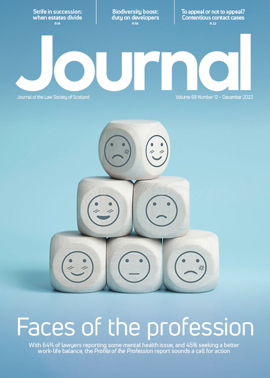Limits of a course of conduct

After the famine of cases referred to in my June article, I have a flood of cases to contend with as if decks are being cleared for the summer. Several of the decisions are of particular note.
Withdrawal of culpable homicide
In Gibb and Laurie v HM Advocate [2017] HCJAC 75 (8 November 2017), the appellants had been convicted of murdering a man at his home in Aberdeen. The deceased had been subjected to a prolonged assault with fists, feet and stamping on his head and body. His body was only discovered about 10 days later.
Gibb’s mother had been in a relationship with the deceased, but they had separated due to his infidelity. The deceased had indicated to friends he was fearful of Gibb and his friends and that they would attack him.
The appellants were overheard making various admissions at a party, before the body was discovered, about assaulting the deceased and leaving him in his house. After arrest, Gibb paced up and down his cell talking to himself about assaulting the deceased with a dog lead and “stomping” on him. Laurie made similar admissions to witnesses that he had been fighting with the deceased and was handing himself in for killing or murdering him. It was accepted the case against Gibb was the stronger one; the appellants had incriminated each other. At the conclusion of the evidence the advocate depute raised the possibility of a verdict of culpable homicide against Laurie. Neither defence counsel raised the matter in their speeches. The trial judge withdrew the possibility from the jury, saying that in view of the litany of injuries sustained there was no scope for a conviction for culpable homicide.
The Appeal Court noted the authorities of Parr v HM Advocate 1991 SLT 208 and Brown v HM Advocate 1993 SCCR 383 at 391, that such a verdict should be withdrawn only with great caution and where there was no basis for it. The judge had indicated that the jury could convict Gibb as the main actor and Laurie art and part. The withdrawal of the verdict was considered a material misdirection and the convictions were quashed.
At the retrial in July 2018 both men were convicted of murder and sentenced to 18 years’ imprisonment (Daily Record, 6 July 2018), hence the late publication of this opinion.
Press contempt of court
Speaking of the Daily Record, that newspaper and its sister publication were in the dock recently and admitted contempt of court for publishing articles in February and May 2017 about individuals who had appeared on petition but had not yet gone on trial: HM Advocate v Scottish Daily Record and Sunday Mail Ltd [2018] HCJAC 32 (4 October 2017). The articles gave lurid descriptions of the men as gangsters involved in drugs and firearms. Both articles had been “legalled” by solicitors: in one case the lawyer was unwell and should not have been at work; in the other the editor proceeded against advice. Both articles were deemed to be glaringly flagrant contempts; the court imposed a cumulo penalty of £80,000.
By contrast, in HM Advocate v Scotsman Publications Ltd 1999 SCCR 163, where the newspaper published seriously prejudicial information in a Glasgow case after the accused had appeared on petition, the court restricted the fine to £10,000 on account of the paper’s very small readership in the west of Scotland!
It was noticeable how restrained the press coverage was of the young girl, Alesha MacPhail, found dead on the Island of Bute and the subsequent appearance on petition of a youth charged with murder.
That man again!
Two recent cases arise out of the Moorov doctrine.
In JM v HM Advocate [2018] HCJAC 30 (30 May 2018) there was said to be a lack of compelling circumstances capable of overcoming a very substantial time gap of just under 17 years between alleged offending. The first charge was one of lewd and libidinous practices on a complainer aged nine, on various occasions between September and December 1997, by handling her naked body and inserting fingers into her vagina. Two other charges involved a complainer aged six or seven, between December 2014 and July 2015. The accused allegedly masturbated in her presence, handled her naked body and lay down beside her. On both occasions he had ingratiated himself with the children’s families and secured their trust such as to be able to bath them without anyone present.
The court did not regard the similarities as of such a striking or extraordinary nature that suggested they were part of the same course of conduct pursued by the appellant, and allowed the appeal.
On the other hand, in RMY v HM Advocate [2018] HCJAC 41 (11 July 2018), a time lapse of five to seven years between the charges did not require the sheriff to find any similarities to be exceptional or extraordinary, and that appeal was refused. The appellant faced two charges of lewd, indecent and libidinous practices, first towards his niece, then aged four to seven, between September 1967 and September 1970, and secondly towards a girl aged 10 to 11 years between May 1975 and May 1977.
Multiple offences, single charge
As the profession still struggles to cope with the fallout from s 288BB of the Criminal Procedure (Scotland) Act 1995, which allows various sexual offences to be charged together (along with their implied alternatives), the astonishing case of Spinks v Procurator Fiscal, Kirkcaldy [2018] HCJAC 37 (13 June 2018) was dealt with by the High Court on further appeal from the Sheriff Appeal Court.
The appellant was accused of assaulting a woman on various occasions between 1 January 2013 and 27 March 2017. The couple had been in a relationship since 2010 and resided together from 2011 until May or June 2016. The complainer spoke to eight assaults on her by the appellant; on the last occasion she had been taken to the appellant’s house by a friend. At interview the appellant admitted punching the complainer on one occasion about two or three years before. A neighbour spoke about the couple having had a volatile relationship, but this evidence could not be related to the incidents spoken to by the complainer. The Crown relied on Stephen v HM Advocate 2007 JC 61, but that is only authority that each detail of an assault need not be corroborated. The Sheriff Appeal Court held that no corroboration was required for what were essentially different species facti of an overall single charge.
The Crown submitted that where offences committed over a prolonged period, albeit on separate occasions, were so linked in time, character and circumstances as to demonstrate they were part of a single course of conduct, all that was required was corroboration of some episodes for corroboration of the whole. The Appeal Court could not agree with this submission, which amounted to a substantial change in the law. In a single charge of assault all that was needed from another source was that some form of assault took place and the appellant perpetrated the assault; the situation was quite different where there were separate incidents. In that situation the normal requirement of corroboration applied to each incident. The conviction was restricted to one incident which coincided with the appellant’s admission and the last incident which was witnessed. The appellant’s community payback order was reduced accordingly. Moorov is not dead!
Attempting to pervert
Hanley v HM Advocate [2018] HCJAC 29 (1 June 2018) arguably extends the law in relating to attempting to pervert the course of justice.
The appellant had been remanded on charges of attempted murder; arrangements were made to hold an “old fashioned” identification parade, which two women were asked to attend. The appellant contacted two men and asked them to induce or coerce the women into not identifying him or anyone else at the parade. Arguments at trial that the charge was irrelevant and the evidence insufficient were rejected by the judge. There was no evidence that the appellant had any engagement with the witnesses.
It was noted by the court that Gordon’s Criminal Law, para 1-32 stated that this crime had developed since the institutional writers; Dalton v HM Advocate 1951 JC 76 held that attempts to persuade a witness not to identify a particular person could constitute the crime.
The Appeal Court concluded that using third parties to communicate instruction did not make the charge irrelevant, as “The drawing of such a formal distinction, on account of lack of direct engagement with the witness, would defeat the practical utility and deterrent effect of such charges.” The appeal was refused and the sentence of four years’ imprisonment affirmed.
Section 275 applications
Shield legislation has been in place since 2002 to protect complainers in sexual cases from unnecessary questioning about sexual matters which do not form part of the charges.
In LL v HM Advocate [2018] HCJAC 35 (15 June 2018) an application under s 275 of the 1995 Act had been refused by the judge at a preliminary hearing. The appellant was charged with a rape committed in July 2016. A special defence of consent was lodged; in the application it was averred the appellant and complainer had consensual sexual intercourse in October 2015. The application was not opposed by the Crown, but the judge did not consider any justification had been put forward in support, other than that the defence wished to show the “full picture”. The judge had not been told of any circumstances which had led to a reasonable, albeit mistaken, belief on the part of the appellant that the complainer was consenting.
The Crown opposed the application at the appeal hearing, indicating it should have been opposed previously. The court, while not ruling out a previous sexual episode as being relevant, was of the view that the probative value of allowing evidence of the earlier sexual incident to be led was slight in relation to the offence charged. The central issues were the free agreement of the complainer and the reasonable belief of the appellant having regard to the steps he took to ascertain whether there was consent. The appeal was refused.
Reasonable belief in rape cases
Most rape trials proceed on the basis of a defence of consent. The jury require to be directed that they had to be satisfied that in order to find corroboration of lack of reasonable belief, the complainer had to have been exhibiting distress at the time of the incident and this was corroborated by another person or other evidence that there was no consent.
In Wilkinson v HM Advocate [2018] HCJAC 39 (27 June 2018) the appellant and complainer, both aged 20, were close platonic friends. After a night out they took a taxi home, but the appellant took the complainer to his house and they ended up sharing a bed fully clothed. The appellant handled and penetrated the complainer’s vagina with his fingers, despite her protestations, and then raped her during which time she was crying. She phoned a taxi immediately and left the house. The driver said she appeared upset, had been crying. When she got home she contacted a friend, who described her voice as shaky, strange and not herself; she was quite distressed and crying rather than talking when she told him what happened.
The appellant sent the complainer two incriminating texts apologising for what had happened. The appeal was refused as it was clear the jury had believed the complainer and rejected the appellant’s evidence. There was clear evidence of rape deriving from the texts alone.
In this issue
- Acting in the best interest of the company?
- Social housing: the ground rules change
- Supporting your EU staff
- Sands run out on offshore interests
- Familiar faces not welcome
- Reading for pleasure
- Opinion: Pol Clementsmith
- Book reviews
- Profile: Robert Rennie
- President's column
- Moving from Registers Direct to ScotLIS
- People on the move
- Good on paper?
- When 1 + 1 = 3
- Voice of the child
- Curators ad litem: who pays, and for what?
- Limits of a course of conduct
- Asleep on the job?
- Affidavits – essential reading
- Prisoner privacy proportionality
- Not just a matter of form for employers
- Scottish Solicitors' Discipline Tribunal
- Keep your beneficiary nominations up to date
- See-through titles: setting the scene
- In-house traineeships: time for an in-depth look
- Public policy highlights
- Paralegal pointers
- Police interview advice: a skill to learn
- Swimming, not sinking
- The lawyer and the geek
- Ask Ash






